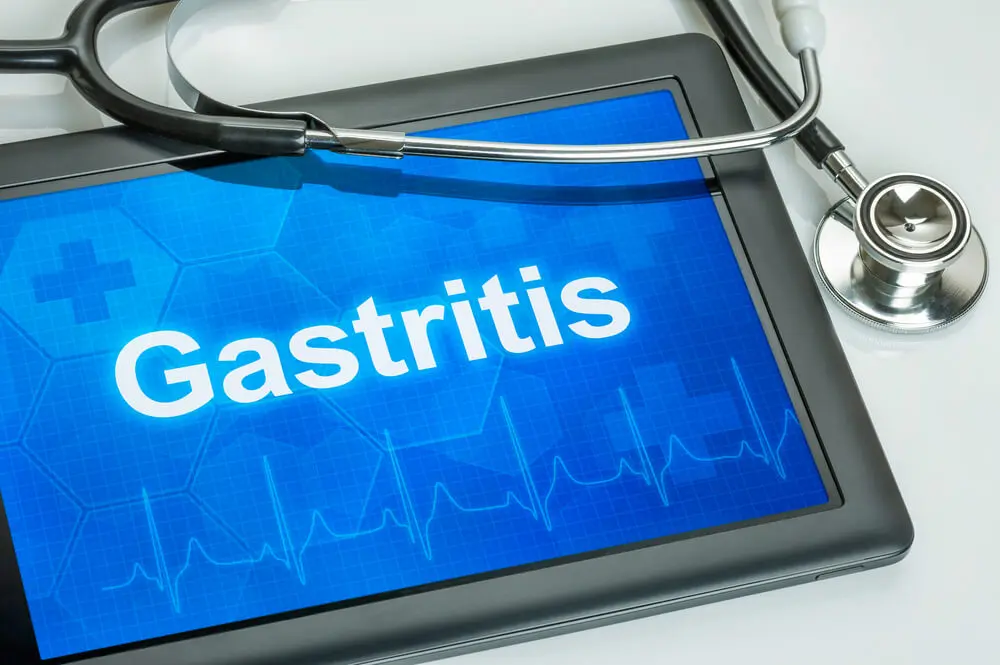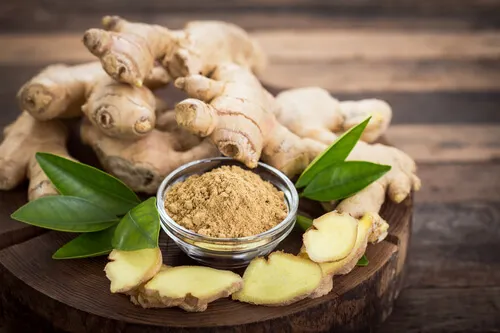Natural Remedies to Relieve Gastritis

To relieve gastritis there are a number of natural remedies that are often effective. They’re considered a palliative therapy, one that complements the recommendations and treatment prescribed by the doctor. Indeed, to treat gastritis, experts use a combination of antibiotics, proton pump inhibitors, acid blockers, and antacids.
Thus, the use of natural remedies to relieve gastritis doesn’t replace the main treatment. You can take advantage of them in a complementary way, if possible after seeking a doctor’s recommendations. With these caveats in mind, we have compiled the best ones to use.

5 natural remedies to relieve gastritis
As experts point out, most episodes of gastritis develop due to the H. pylori infection. It’s often classified into two types: acute gastritis and chronic gastritis. The use of medication, excessive alcohol intake, reflux, diet, and underlying gastric diseases can all trigger it.
Read also: Myths and Truths About Food for Gastritis
There are many natural remedies to relieve gastritis. Most of them are only anecdotal or empirical. On this occasion, we’re going to show you 5 home therapies for gastritis that have some scientific support.

1. Ginger infusion
There is evidence that ginger is capable of preventing gastric ulcers induced by Helicobacter pylori. It has been used as a palliative treatment for gastritis with mild and moderate effects. The best way to take advantage of it is through an infusion in which you can also include lemon and honey to make it more pleasant.
2. Honey
A study published in the Sultan Qaboos University Medical Journal found that honey can inhibit H. pylori infections. It thus has antibacterial properties, and it is also known that it can protect the human gastric mucosa. Manuka honey has been suggested to be the most effective for this, although you can use any type of honey.
In principle, you can drink a tablespoon of honey on an empty stomach and another before bedtime, or thirty minutes before each meal. Also, you can take advantage of it by including it in infusions and teas; as we have recommended in the previous therapy.
3. Fermented and enriched milks
Various studies and research have found that fermented and enriched milk can be a great ally when treating gastritis. Those that contain strains of Lactobacillus johnsonii, Streptococcus thermophilus and others are the most effective. Drink a glass of milk a day as a preventative. His ability to alleviate a specific episode is more reserved.
4. Green tea
Green tea has been used to treat episodes of chronic atrophic gastritis with great effectiveness. There is evidence that it can inhibit the growth of H. pylori, so its antimicrobial properties are well established. If you wish, you can combine it with other natural remedies to relieve gastritis that we have indicated to enhance its effects.
5. Aloe vera
Experts endorse the use of aloe vera to treat chronic stomach ulcers. In addition, it has been suggested that it can inhibit the production of gastric acid, which has a direct effect on the symptoms of gastritis. You can opt for capsules with its extract, or drink a glass juice on an empty stomach.
Recommendations
To try to relieve gastritis you must make some significant changes in your lifestyle, especially in relation to food.
Avoid eating dairy products, at least until you feel better. In addition, you should drink plenty of water. At least eight glasses a day are recommended. You should also increase your intake of vitamin E, as it will help reduce stomach inflammation.
In addition, another way to calm nausea and vomiting is by consuming pineapple and papaya seeds. However, keep in mind that they should be eaten raw for them to have an effect.
You may be interested in: The Properties and Uses of Ginger
You should plan how you’re going to distribute your meals during the day. We recommend you eat several meals, usually 5 a day, and small portions.
Avoid eating large meals, as it can increase the problem by increasing the unpleasant symptoms. In addition, you should eliminate acidic foods, as well as fried, fatty, or spicy. The same applies to alcoholic beverages.
Additional advice: clean your intestines
The intestines are a fundamental part of the digestion process. In addition to allowing the absorption of nutrients and the expulsion of elements your body no longer needs, it also influences the production and control of other conditions.
In this case, gastritis can be directly linked to an intestinal problem, where these organs are in a state where they need to be purified to improve their functioning.
As you can see there are many treatment options that can significantly improve your health.
However, if the symptoms don’t subside, you should see a doctor to properly diagnose your case and assess the treatment to follow.
All cited sources were thoroughly reviewed by our team to ensure their quality, reliability, currency, and validity. The bibliography of this article was considered reliable and of academic or scientific accuracy.
- Almasaudi SB, Abbas AT, Al-Hindi RR, El-Shitany NA, Abdel-Dayem UA, Ali SS, Saleh RM, Al Jaouni SK, Kamal MA, Harakeh SM. Manuka Honey Exerts Antioxidant and Anti-Inflammatory Activities That Promote Healing of Acetic Acid-Induced Gastric Ulcer in Rats. Evid Based Complement Alternat Med. 2017;2017:5413917.
- Avijgan M, Kamran A, Abedini A. Effectiveness of Aloe Vera Gel in Chronic Ulcers in Comparison with Conventional Treatments. Iran J Med Sci. 2016 May;41(3 Suppl):S30.
- Ghaffari A, Somi MH, Safaiyan A, Modaresi J, Ostadrahimi A. Honey and apoptosis in human gastric mucosa. Health Promot Perspect. 2012 Jul 1;2(1):53-9.
- Haniadka R, Saldanha E, Sunita V, Palatty PL, Fayad R, Baliga MS. A review of the gastroprotective effects of ginger (Zingiber officinale Roscoe). Food Funct. 2013 Jun;4(6):845-55.
- Keshavarzi Z, Rezapour TM, Vatanchian M, Zare Hesari M, Nabizade Haghighi H, Izanlu M, Sabaghian M, Shahveisi K. The effects of aqueous extract of Aloe vera leaves on the gastric acid secretion and brain and intestinal water content following acetic acid- induced gastric ulcer in male rats. Avicenna J Phytomed. 2014 Mar;4(2):137-43.
- Nzeako BC, Al-Namaani F. The antibacterial activity of honey on helicobacter pylori. Sultan Qaboos Univ Med J. 2006 Dec;6(2):71-6.
- Nikkhah Bodagh M, Maleki I, Hekmatdoost A. Ginger in gastrointestinal disorders: A systematic review of clinical trials. Food Sci Nutr. 2018 Nov 5;7(1):96-108.
- Muszyński J, Ziółkowski B, Kotarski P, Niegowski A, Górnicka B, Bogdańska M, Ehrmann-Jóśko A, Zemlak M, Młynarczyk-Bonikowska B, Siemińska J. Gastritis – facts and doubts. Prz Gastroenterol. 2016;11(4):286-295.
- Pantoflickova D, Corthésy-Theulaz I, Dorta G, Stolte M, Isler P, Rochat F, Enslen M, Blum AL. Favourable effect of regular intake of fermented milk containing Lactobacillus johnsonii on Helicobacter pylori associated gastritis. Aliment Pharmacol Ther. 2003 Oct 15;18(8):805-13.
- Pennelli G, Grillo F, Galuppini F, Ingravallo G, Pilozzi E, Rugge M, Fiocca R, Fassan M, Mastracci L. Gastritis: update on etiological features and histological practical approach. Pathologica. 2020 Sep;112(3):153-165.
- Rodríguez C, Medici M, Rodríguez AV, Mozzi F, Font de Valdez G. Prevention of chronic gastritis by fermented milks made with exopolysaccharide-producing Streptococcus thermophilus strains. J Dairy Sci. 2009 Jun;92(6):2423-34.
- Shibata K, Moriyama M, Fukushima T, Kaetsu A, Miyazaki M, Une H. Green tea consumption and chronic atrophic gastritis: a cross-sectional study in a green tea production village. J Epidemiol. 2000 Sep;10(5):310-6.
- Stoicov C, Saffari R, Houghton J. Green tea inhibits Helicobacter growth in vivo and in vitro. Int J Antimicrob Agents. 2009 May;33(5):473-8.
This text is provided for informational purposes only and does not replace consultation with a professional. If in doubt, consult your specialist.








